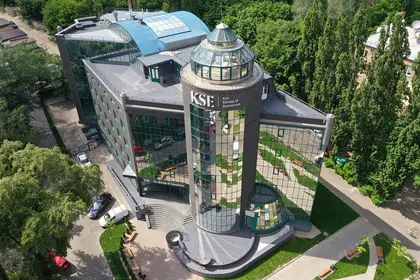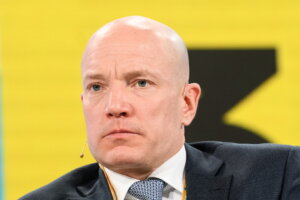When Tymofiy Mylovanov took over the Kyiv School of Economics in 2016, the school was, in his words, “in disarray.” Mylovanov had to restructure the de-facto bankrupt school’s debt and cut personnel by 30%. With a bad reputation, the school had trouble attracting donors.
Without proper financing, the school was having a hard time expanding. With no permanent location, KSE lived off grants and rented office spaces in Kyiv.
JOIN US ON TELEGRAM
Follow our coverage of the war on the @Kyivpost_official.
The plan according to Mylovanov, a former economy minister and a current adviser to President Volodymyr Zelensky’s administration, was to find a permanent location for the school by 2023. In order to do so, KSE’s administration would have to attract millions in financing. The $300,000 they were raising yearly after Mylovanov’s arrival wasn’t enough.
Fiala to the rescue
Among the interested investors, one emerged victorious. After originally agreeing to partially finance the purchase of a school building, Thomas Fiala, CEO and founder of Dragon Capital, Ukraine’s leading private equity firm, decided to finance the entire project.
“It’s the usual Ukrainian story where the investor says ‘why don’t I just finance everything?’ Mylovanov remembered about Fiala’s decision to finance the purchase. In total, Dragon Capital invested $5 million in the purchase and construction of a 4,441 square-meter school building.
KSE’s success story is related to a larger global trend where corporate social responsibility (CSR) criteria have come to play a more central role in decisions about how companies allocate their financial investments.
Dragon Capital is one of the companies that jumped on the bandwagon. According to Fiala, the 2014 EuroMaidan Revolution that ended President Viktor Yanukovych’s rule was a wake-up call to expand the firm’s CSR program. “We didn’t want Ukraine to risk slipping into authoritarianism like its eastern neighbors,” Fiala told the Kyiv Post.
In 2020, Dragon Capital’s CSR spending amounted to $5.8 million, the vast majority of it going to KSE and other universities in Ukraine. In addition to educational institutions, the firm gave to think tanks, namely Ukraine’s leading anti-corruption organization, Antac, the military, as well as other non-profit organizations in the country.
In April of this year, Dragon Capital purchased Ukrainska Pravda, Ukraine’s largest newspaper, the second media company in the firm’s portfolio after creating Novoe Vremya in 2014.
To Fiala, it makes economic sense for businesses to spend 5–10% of their revenue on CSR projects that will make Ukraine a more democratic place with a free economy and rule of law. With a better economy, businesses will make more money. “You can do CSR purely for egoistic reasons as a businessman,” Fiala told the Kyiv Post.
Self-preservation
If anything, CSR programs are good for self-preservation.
“In a country where there is such a big gap between the rich and poor, it’s wise for businesses to spend money on building a school rather than buying expensive houses or airplanes or yachts because it can provoke pushback from the population,” Fiala said.
If KSE was once in trouble, Dragon Capital’s investments, along with the hundreds of thousands of dollars Mylavanov has raised in addition from companies like Farmak, Nova Poshta, and Investment Capital Ukraine, it is now shaping up to be a leading, Western-style institution in Ukraine.
The school is registered in the United States, meaning it can issue American diplomas. Its staff is also made up primarily of professors with Western Ph.D. degrees.
$2 million endowment
This fall the school will open its first bachelor’s degree program and by the end of the year it will have an endowment of $2 million, a little more than $1 million of it donated by Fiala himself.
Mylovanov suspects Fiala was inspired by the late David Swensen, who is credited with perfecting the university endowment investment model during his 30+ years at Yale University, in deciding to create an endowment at KSE. During Swensen’s tenure, he grew the endowment from $1 billion to over $30 billion.
Mylovanov says they plan to invest $1 million of the endowment towards fixed income instruments in Ukraine, such as eurobonds to support the Ukrainian economy. The rest they will diversify in different internationally traded funds.
When it comes to attracting more money, Mylovanov is militant in only taking money from donors who are serious about bettering Ukraine through education, even at the expense of taking money from interested donors.
To him, socially responsible fundraising is less about taking as much money as possible and more about taking money from sources students will be proud of. “We need to have donors who care about the kids because otherwise they will sense insincerity and they’ll get demotivated and offended,” he said.
Fiala may have passed Mylovanov’s test. But producing a powerhouse of economists that might one day work at Dragon Capital would be good for business. Several KSE alumni already work at the firm, including its chief economist, Olena Bilan.
KSE is a shining example in a country where the university system is often associated with corruption and inefficiency. The school’s success then begs the question of whether or not it has the potential to transform the university education system at large.
Mylovanov doesn’t seem to think so. “Ukraine’s universities are unreformable,” he said. KSE tried out a joint masters program with two Ukrainian universities and according to him, “they failed.” Professors at the other universities were copying notes and publishing others’ work as their own.
The majority of Dragon Capital’s education lending and donations have gone to KSE and the Ukrainian Catholic University in Lviv, both private universities, as well as the Kyiv Mohyla Academy, one of the best research universities in Ukraine.
Fiala said that Dragon Capital chooses whom they invest in very carefully, choosing to work with people they know and who have a good track record. So far, they haven’t been disappointed, he said.
But in a cautious investing environment, many Ukrainian universities are left out of the corporate social responsibility spending spree.
You can also highlight the text and press Ctrl + Enter





